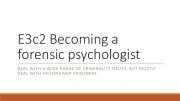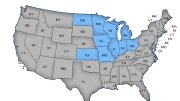 Forensic psychologists are most commonly licensed psychologists who specialize in applying psychological knowledge to legal matters, both in the criminal and civil arenas. They hold graduate degrees in psychology, most often a PhD or a PsyD.
Forensic psychologists are most commonly licensed psychologists who specialize in applying psychological knowledge to legal matters, both in the criminal and civil arenas. They hold graduate degrees in psychology, most often a PhD or a PsyD.
Forensic psychology is a subdiscipline of psychology. It has its own professional organizations, training programs, and research journals. Forensic psychologists are found in academia, public service, and the private sector.
Forensic psychologists assist in a wide variety of legal matters, including:
- mental state examinations of criminal defendants (insanity, competency to stand trial, etc.)
- child custody/family law
- violence risk assessment
- civil law (personal injury cases)
- social science research (e.g., explaining a scholarly topic such as memory research to a jury)
- mediation/dispute resolution
- jury selection
What is the state of the field?
Forensic psychology is a rapidly growing discipline. The last time I checked, the American Psychology-Law Society had about 3, 000 members, and it continues to grow. Its exponential growth is driven by a couple of factors. Many clinical psychologists have turned to forensic work to escape the confines of managed care. And students are attracted by our culture's obsession with all things criminal (as well as fictional depictions such as in the TV show Criminal Minds).The growth of forensic psychology is not without controversy. Some accuse forensic psychologists of being hired guns who can be paid to parrot a certain opinion. Recent court decisions are causing increasing scientific scrutiny of psychological evidence. This in turn is leading to the development of increasingly rigorous training programs, instruments, and procedures that will allow us to withstand such adversarial scrutiny.
 In the long run, well-trained forensic psychologists will likely fare well in the increasingly skeptical and demanding marketplace of the future.
In the long run, well-trained forensic psychologists will likely fare well in the increasingly skeptical and demanding marketplace of the future.
What skills must a forensic psychologist have?
Forensic psychologists are psychological scientists. We compare data from multiple sources in order to test alternative hypotheses. The emphasis is on written reports and court testimony that are scientifically valid and can withstand scrutiny in the adversarial environment of the courtroom. A good forensic psychology combines a strong science background with solid investigatory skills.Becoming a successful forensic psychologist requires, at minimum, the following:
- solid clinical psychology training and experience
- firm grounding in scientific theory and empirical research (understanding of scientific validity, research design, statistics, and testing)
- critical thinking skills
- thorough knowledge of social and cultural issues
- legal knowledge (including mental health law, case law, and courtroom procedures)
- excellent writing skills
- strong oral presentation skills
- ability to maintain one's composure under stress
Can I pursue forensic psychology as an undergraduate major?
I get a lot of queries from high school students who have searched high and low for forensic psychology undergraduate programs, and come up empty. That is because forensic psychology is only rarely offered as an undergraduate major. The specialization process begins much later – in graduate school or beyond.High school students interested in forensic psychology may choose to major in psychology in college. However, even this is not a requirement. Some professionals and educators even advocate that you major in something other than psychology, in order to get a more well-rounded education. (I myself majored in journalism, and worked in that field before deciding to become a psychologist. I didn't take one single psychology course in college.)
Forensic psychology is a postdoctoral specialization. That means that a student first obtains a doctoral degree (PhD or PsyD) in clinical psychology, and then pursues a postdoctoral specialization in forensics.
Must I earn a doctoral degree to become a forensic psychologist?
With the meteoric rise in popularity of forensic psychology, for-profit educational institutions are rushing to cash in. Distance-learning options have sprouted up like mushrooms after a heavy rain. So too, terminal master's programs are an increasingly popular option – requiring only one or two years of postgraduate education in lieu of the traditional four or more.Master's level degrees may ultimately be a case of false advertising. Master's level clinicians will probably have trouble competing in a field dominated by professionals with more advanced degrees. As I wrote in a 2009 essay that was critical of this trend, "Would you trust a 'master's level dentist' to pull your tooth? Or a 'bachelor's level attorney' to defend you in court?" I predict that, at least in the near term, these clinicians will be restricted to lower-level occupations in the prison-industrial complex.
A growing number of graduate schools are also bucking the postdoctoral tradition by adding forensic tracks, so that students can begin their forensic specialization during graduate school.
Source: forensicpsychologist.blogspot.com
You might also like:






|
Sexual abuse accusations color custody battles: consider child's age, physical or mental disabilities, feelings of alienation when evaluating ... An article from: Clinical Psychiatry News Book (International Medical News Group) |














